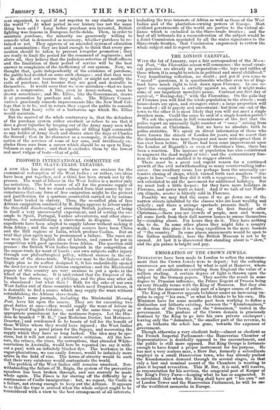PROPOSED INTERNATIONAL COMMITTEE ON THE SLAVE-TRADE TREATIES. A NEW idea
has dawned upon those who are anxious for the economical redemption of the West Indies • or rather, two ideas '
have been put together, and a third has been struck out by the process. The want of labour in the West Indies is a matter only too notorious. The best source of all for the genuine supply of labour is Africa ; but we stand excluded from that source by cir- cumstances that any form of free emigration might be the pretext and justification for a spurious counterfeit carried on by nations that haie traded in slavery. Thus, the so-called plan of free African emigration conducted by M. Regis appears to labour under the threefold disadvantage of arousing British jealousy, of being in itself a very unsuccessful experiment, and of setting the ex- ample to Spain, Portugal, Yankee adventurers, and other slave- traders, for reestablishing a slave-trade in disguise. Various expedients have been adopted to supply labour without seeking it from Africa • and the most promising sources have been China and the Hill regions of India, which produce Coolies. But on trial that plan again may be pronounced a failure. The races are too weak for the English idea of labour, and cannot be put in competition with good specimens from Africa. The question still presses : the British West Indies languish in the competition of the sugar-trade for want of hands ; our own subjects suffer injury through our philanthropical policy, without success in the ex- tinction of the slave-trade. Whatever may be the failure of the Regis plan as its author designed it, it has undoubtedly opened the door for a new form of African emigration ; and the Ministerial papers of this country are very anxious to put a spoke in the wheel of that scheme. It is understood that the Emperor of the French has shown signs of yielding, and the plan may after all be abandoned : but vshat then ? ath for the sake of our own West Indies and of those countries which need Tropical labour, it is desirable to find a source which may supply the want without reestablishing the African slave-trade. Eureka! some journals, including the Ministerial Morning Post, have hit upon the source. They are for executing two great duties at once—they would supply the want of labour in the Tropical English Colonies, and at the same time supply an appropriate punishment for the mutinous Sepoys. Let the Hin- doos be branded "M. D.," [not Medicinte Doctor, but Mutineer- Deserter,] and condemned to be beasts of toil for the benefit of those Whites whom they would have injured ; the West Indies thus becoming a penal prison for the Sepoys, and recovering the supply which they have so long lacked. The idea may be spe- cious, but it will not stand a moment's criticism. All the hor- rors, the crimes' the vices, the corruptions, that attended White- convictism in Australia, would here be repeated (we say it with- out a pun) with an infinitely blacker dye. The workmen in the sugarldantations, we can easily foresee, would be infinitely more active in the field of vice. The forms of atrocity would be such that their very existence would contaminate the world. The problem of the West Indies still remains unsolved. Not- withstanding the failure of M. Regis, the system of the preventive squadron has been broken through, and can scarcely be made Whole again. The Times is for staving off the difficulty by a continuance of Coolie immigration : but, we repeat, the Coolie is a failure' not strong enough to keep out the African. It appears to us that the time is arrived when the whole subject ought to be reconsidered with a view to the best arrangement of all interests,
including the true interests of Africa as well as those of the West Indies and of the plantation-owning powers of Europe. Most civilized governments of the world are parties to the virtual al- liance which is embodied in the Slave-trade treaties ; and the best of all tribunals for a reconsideration of the subject would be a Joint Commission appointed by all the states signataries to the Slave-trade treaties, that Commission empowered to review the whole subject and to report upon it.


































 Previous page
Previous page